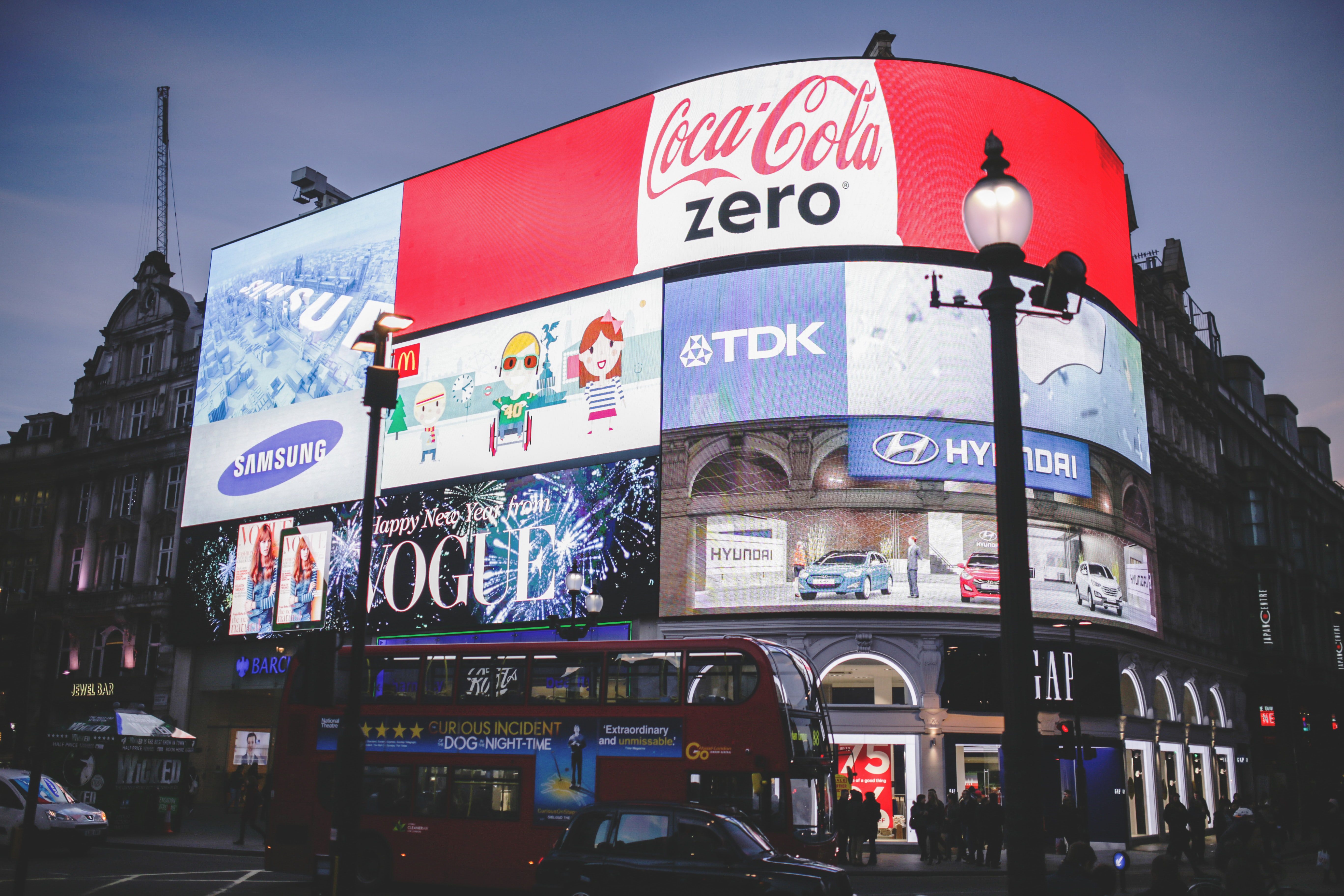In London at the start of the year, perhaps there was more advertising than there usually is in my life, because I found its presence disgusting and upsetting. Could I not use public transport without having my mind intruded upon continually by trite performative questions?

Sometimes I fantasize about a future where stealing someone’s attention to suggest for the fourteenth time that they watch your awful-looking play is rightly looked upon as akin to picking their pocket.
Stepping back, advertising is widely found to be a distasteful activity. But I think it is helpful to distinguish the different unpleasant flavors potentially involved (and often not involved—there is good advertising):
1. Mind manipulation: Advertising is famous for uncooperatively manipulating people’s beliefs and values in whatever way makes them more likely to pay money somehow. For instance, deceptively encouraging the belief that everyone uses a certain product, or trying to spark unwanted wants.

2. Zero-sumness: To the extent advertising is aimed at raising the name recognition and thus market share of one product over its similar rivals, it is zero or negative sum: burning effort on both sides and the attention of the customer for no overall value.


3. Theft of a precious thing: Attention is arguably one of the best things you have, and its protection arguably worthy of great effort. In cases where it is vulnerable—for instance because you are outside and so do not personally control everything you might look at or hear—advertising is the shameless snatching of it. This might be naively done, in the same way that a person may naively steal silverware assuming that it is theirs to take because nothing is stopping them.

4. Cultural poison: Culture and the common consciousness are an organic dance of the multitude of voices and experiences in society. In the name of advertising, huge amounts of effort and money flow into amplifying fake voices, designed to warp perceptions–and therefore the shared world–to ready them for exploitation. Advertising can be a large fraction of the voices a person hears. It can draw social creatures into its thin world. And in this way, it goes beyond manipulating the minds of those who listen to it. Through those minds it can warp the whole shared world, even for those who don’t listen firsthand. Advertising shifts your conception of what you can do, and what other people are doing, and what you should pay attention to. It presents role models, designed entirely for someone else’s profit. It saturates the central gathering places with inanity, as long as that might sell something.

5. Market failure: Ideally, whoever my attention is worth most to would get it, regardless of whether it was initially stolen. For instance, if I have better uses for my attention than advertising, hopefully I will pay more to have it back than the advertiser expects to make by advertising to me. So we will be able to make a trade, and I’ll get my attention back. In practice this is probably too complicated, since so many tiny transactions are needed. E.g. the best message for me to see, if I have to see a message, when sitting on a train, is probably something fairly different from what I do see. It is also probably worth me paying a small sum to each person who would advertise at me to just see a blank wall instead. But it is hard for them to collect that money from each person. And in cases where the advertiser was just a random attention thief and didn’t have some special right to my attention, if I were to pay one to leave me alone, another one might immediately replace them.1

6. Ugliness: At the object level, advertising is often clearly detracting from the beauty of a place.

These aren’t necessarily distinct—to the extent ugliness is bad, say, one might expect that it is related to some market failure. But they are different reasons for disliking a thing-a person can hate something ugly while having no strong view on the perfection of ideal markets.
What would good and ethical advertising look like? Maybe I decide that I want to be advertised to now, and go to my preferred advertising venue. I see a series of beautiful messages about things that are actively helpful for me to know. I can downvote ads if I don’t like the picture of the world that they are feeding into my brain, or the apparent uncooperativeness of their message. I leave advertising time feeling inspired and happy.

It bothers me on a fundamental level that we've been conditioned to accept ads as "the price of the internet": I want to pay $5 for an app with no ads/IAP, not be advertised to forever. I want to pay $5 a month to listen to a podcast without ads, not have my precious time taken up with podcast hosts (aka People I Trust) telling me about how much they love whichever meal box kit is paying them this year.
I put my money where my mouth is, btw: I support ad-free podcasts, or podcasts with unlockable ad-free versions, on Patreon (as ad-free is becoming a more common perk, it's beginning to get expensive, but podcast-listening is my main hobby). I messaged one small podcaster about why she didn't have ad-free versions of her podcast as a patreon perk and she said the reason for it was because her advertisers have a clause stating that there must be no ad-free versions, because apparently the more devoted listeners (the ones who trust the podcasters the most) are their preferred target market.
I also emailed a podcaster I listen to when her podcast ran an ad for a 'product' I knew she wouldn't support if she knew some easily googleable backstory, and she emailed me back, pulled the ad, and said that she hadn't used the product and so didn't know that the product was counteractive to her 'brand'. Obviously, you know a lot of these endorsements are fake, but I find podcasts especially insidious as the podcaster-listener relationship is surprisingly intimate.
So yeah, I completely agree with you. I'm voting with my dollar, to try and make the "paid" business model more sustainable for internet services. Thanks for an enlightening post!
To be honest, I don't care how things will go in the future: at the moment, I'm paying, now, to not experience ads, and I'm hoping that my purchasing decisions in this vein will encourage the sort of behaviour I want. If hosts start incorporating ads into their patron podcasts they'll lose my $5/mo and receive a polite but firm note explaining why.